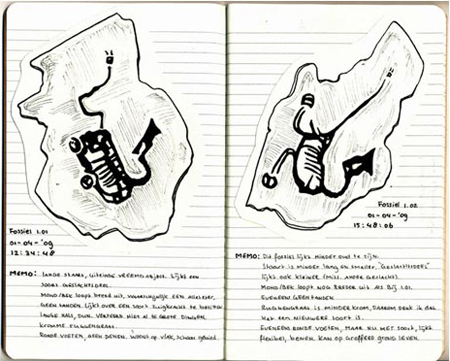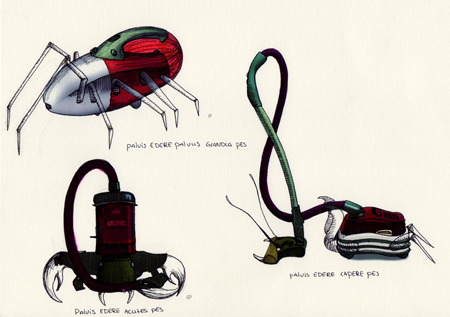Technological Evolution
Charley Reijnders
Evolution, 2009
Like an old fashioned explorer Charley Reijnders wondered around on her self invented ‘Island of Products’ where a remarkable evolution took place after the disappearance of their human creators. Without any interference the new mechanical species evolved from the discarded mass consumer products of a long gone past. In a sketchbook she tried to capture all this new marvels of evolution.
According to Ray Kurzweil, the line between humans and machines will blur as machines attain human-level intelligence and humans start upgrading themselves with cybernetic implants. These implants will greatly enhance human cognitive and physical abilities, and allow direct interface between humans and machines.
‘Once life takes hold on a planet, we can consider the emergence of technology as inevitable. The ability to expand the reach of one’s physical capabilities, not to mention mental facilities, through technology is clearly useful for survival. Technology has enabled our subspecies to dominate its ecological niche. Technology requires two attributes of its creator: intelligence and the physical ability to manipulate the environment. This ability to use limited resources optimally, is inherently useful for survival, so it is favored. The ability to manipulate the environment is also useful; otherwise an organism is at the mercy of its environment for safety, food, and the satisfaction of its other needs. Sooner or later, an organism is bound to emerge with both attributes.
As technology is the continuation of evolution by other means, it shares the phenomenon of an exponentially quickening pace. The word is derived from the Greek tekhn¯e, which means “craft” or “art,” and logia, which means “the study of.” Thus one interpretation of technology is the study of crafting, in which crafting refers to the shaping of resources for a practical purpose.’ (abstract of Ray Kurzweils ‘The Age of Spiritual Machines’)
When a scientist states that something is possible, he is almost certainly right. When he states that something is impossible, he is very probably wrong. The only way of discovering the limits of the possible is to venture a little way past them into the impossible. Any sufficiently advanced technology is indistinguishable from magic.
— Arthur C. Clarke’s three laws of technology



